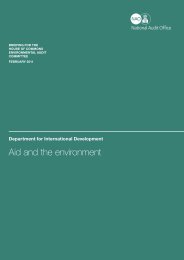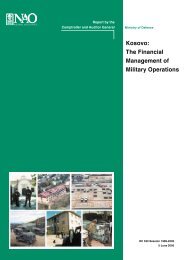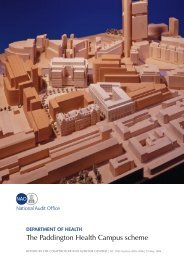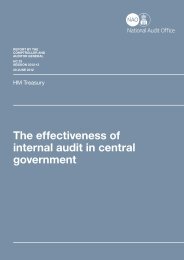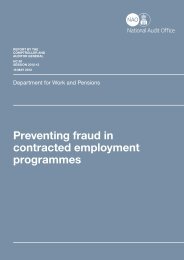Reducing bureaucracy for public sector frontline staff: Briefing for the ...
Reducing bureaucracy for public sector frontline staff: Briefing for the ...
Reducing bureaucracy for public sector frontline staff: Briefing for the ...
You also want an ePaper? Increase the reach of your titles
YUMPU automatically turns print PDFs into web optimized ePapers that Google loves.
<strong>Reducing</strong> <strong>bureaucracy</strong> <strong>for</strong> <strong>public</strong> <strong>sector</strong> <strong>frontline</strong> <strong>staff</strong> Introduction and objectives 7<br />
Introduction and objectives<br />
1 Regulation – including guidance, inspection and reporting – is central to <strong>the</strong><br />
delivery of effective <strong>public</strong> services and provides accountability <strong>for</strong> <strong>public</strong> funds and<br />
essential protection <strong>for</strong> citizens. Regulation also plays an important role in delivering<br />
improvements to services. For example, inspections and reporting can have a critical<br />
role to play in highlighting examples of good and bad per<strong>for</strong>mance and variations in<br />
<strong>public</strong> service. But complying with <strong>the</strong>se requirements imposes a cost across <strong>frontline</strong><br />
services. Public <strong>sector</strong> bodies are subject to many of <strong>the</strong> regulations affecting private<br />
businesses. But in addition, <strong>public</strong> bodies are also affected by specifically <strong>public</strong> <strong>sector</strong><br />
<strong>for</strong>ms of regulation, ei<strong>the</strong>r by Government departments or by specialist bodies such<br />
as <strong>the</strong> various quality inspectorates. Both as a result of regulation, and due to internal<br />
management practices, <strong>public</strong> <strong>sector</strong> workers often complain that <strong>the</strong> delivery of <strong>public</strong><br />
services is hampered by high levels of unnecessary <strong>bureaucracy</strong>.<br />
2 The Government is committed to improving <strong>the</strong> design of new regulations and<br />
simplifying and modernising existing regulations in order to deliver better targeted and<br />
more effective services. The Better Regulation Executive, part of <strong>the</strong> Department <strong>for</strong><br />
Business, Innovation and Skills, is responsible <strong>for</strong> managing and monitoring <strong>the</strong> delivery<br />
of <strong>the</strong> strategy. Much of <strong>the</strong> focus of <strong>the</strong> better regulation agenda has been on reducing<br />
regulatory costs <strong>for</strong> business; now even more important given <strong>the</strong> recent economic<br />
downturn. But <strong>the</strong> <strong>public</strong> <strong>sector</strong> is also affected: at a time of financial stringency, <strong>public</strong><br />
service providers need to reduce <strong>the</strong> level of unnecessary <strong>bureaucracy</strong> to allow <strong>frontline</strong><br />
<strong>staff</strong> to concentrate on delivering high quality services efficiently.<br />
3 In its July 2008 report “ Getting Results: The Better Regulation Executive and<br />
<strong>the</strong> Impact of <strong>the</strong> Regulatory Re<strong>for</strong>m Agenda” 2 , <strong>the</strong> Regulatory Re<strong>for</strong>m Committee<br />
highlighted <strong>the</strong> importance of cutting <strong>bureaucracy</strong> in <strong>the</strong> <strong>public</strong> <strong>sector</strong>. The Committee<br />
called <strong>for</strong> Departments to place renewed focus on <strong>the</strong> government’s target of reducing<br />
<strong>public</strong> <strong>sector</strong> data requests by 30 per cent by 2010. It also recommended that ef<strong>for</strong>ts to<br />
reduce <strong>public</strong> <strong>sector</strong> unnecessary costs be given equal emphasis to ef<strong>for</strong>ts to reduce<br />
regulatory burdens on business under <strong>the</strong> Government’s Administrative Burdens<br />
Reduction programme.<br />
4 This briefing paper provides <strong>the</strong> Regulatory Re<strong>for</strong>m Committee with an overview<br />
of <strong>the</strong> Government’s approach to reducing unnecessary <strong>bureaucracy</strong> on <strong>frontline</strong> <strong>public</strong><br />
<strong>sector</strong> workers and <strong>the</strong> governance arrangements <strong>for</strong> delivering <strong>the</strong>se improvements.<br />
Two years after <strong>the</strong> 2007 <strong>public</strong> <strong>sector</strong> strategy on cutting <strong>bureaucracy</strong>, it comments on<br />
<strong>the</strong> results reported in <strong>the</strong> December 2008 Departmental simplification plans (<strong>the</strong> key<br />
reporting tool) and o<strong>the</strong>r documents. It also reviews <strong>the</strong> approaches followed by <strong>the</strong><br />
five biggest <strong>public</strong> <strong>sector</strong> Departments:<br />
2 House of Commons Regulatory Re<strong>for</strong>m Select Committee: Getting results: The Better Regulation Executive and<br />
<strong>the</strong> Impact of <strong>the</strong> Regulatory Re<strong>for</strong>m Agenda, Fifth Report 2008 HC 474-I.




